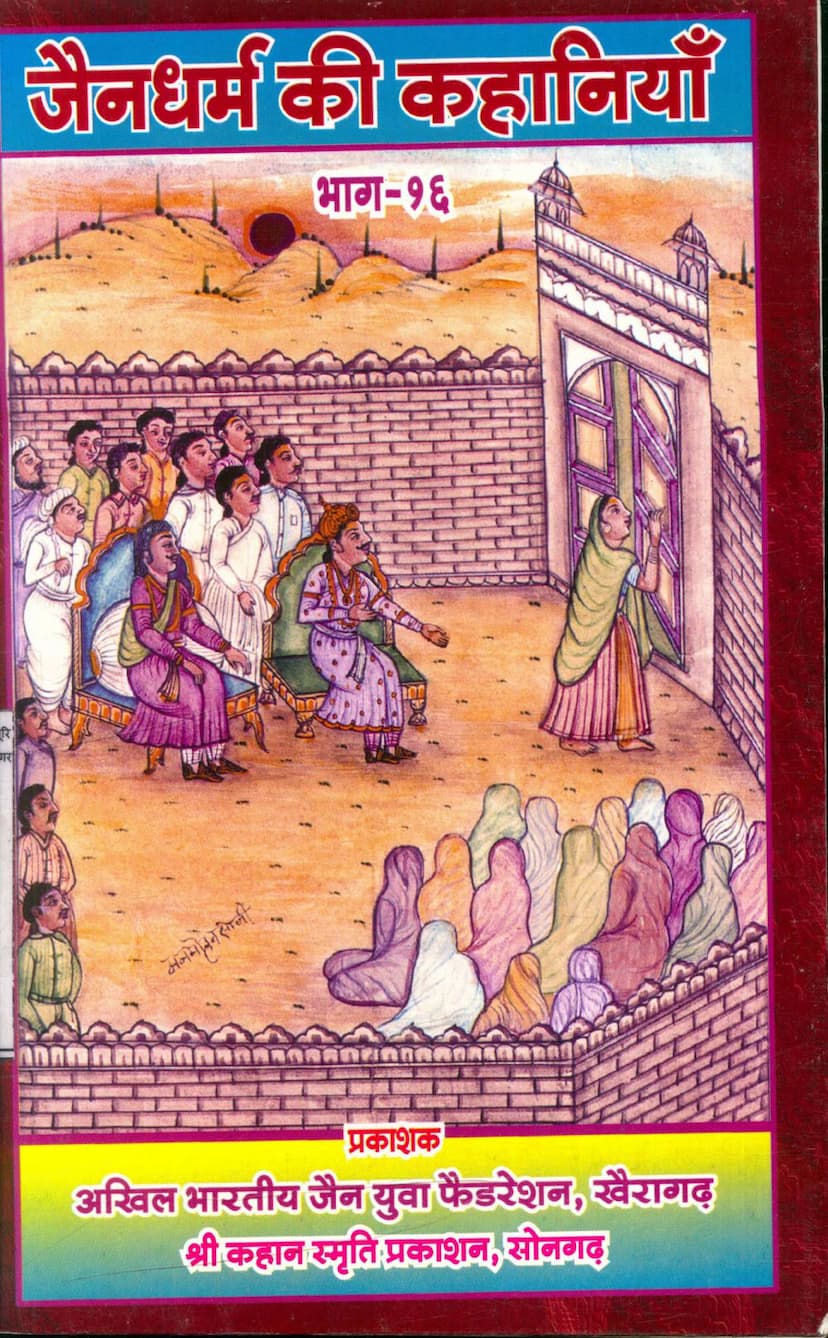Jain Dharm Ki Kahaniya Part 16
Added to library: September 1, 2025

Summary
This document is the 16th volume in the series "Jain Dharm Ki Kahaniya" (Stories of Jainism), published by Akhil Bharatiya Jain Yuva Federation and Shri Kahan Smriti Prakashan. The book features three plays written by Rupvati Jain 'Kiran' and edited by Pandit Rameshchandra Jain Shastri.
The volume is dedicated to the memory of Shri Hemraj Gidiya and Shrimati Dhudhibai Gidiya, whose support led to the establishment of the Shrimati Dhudhibai Hemraj Gidiya Granthamala in 1988, an initiative dedicated to publishing religious literature annually. Shri Hemraj Gidiya, born in 1918, became involved in business at a young age and later found spiritual guidance from Pujya Shri Kanji Swami in 1950. He took Brahmacharya vows in 1953 and was instrumental in the construction of a Digambar Jain temple in Khairagarh in 1959. He also organized a 25-day pilgrimage to South India with 70 devotees.
The book is part of a larger publication effort that has distributed over 700,000 copies of various religious texts, including other volumes of "Jain Dharm Ki Kahaniya." The publisher expresses gratitude to the patrons and members who support their literature fund.
The content of "Jain Dharm Ki Kahaniya Part 16" consists of three plays. The summary provided focuses on the first play, "Jhootha Kalank" (False Blame), which is presented in detail.
Summary of the Play "Jhootha Kalank" (False Blame):
The play revolves around Manorama, the virtuous wife of Sukhanand, a wealthy merchant's son from Vaijayanti Nagar. Sukhanand, inspired by a desire to earn wealth through his own efforts rather than relying on his father's legacy, decides to travel abroad for business. He discusses this with Manorama, who, despite her love for him, supports his decision, though she initially wishes to accompany him. Sukhanand, concerned about the hardships of travel, ultimately leaves her behind.
After Sukhanand's departure, a messenger (duti) from the Prince of Vaijayanti visits Manorama. The prince, infatuated with her beauty, attempts to lure her into an illicit relationship, offering her royal status. Manorama, firmly rooted in her chastity, vehemently rejects his advances and expels the messenger.
The rejected messenger then maliciously misinforms Sukhanand's mother, Suvrutta, about Manorama's supposed infidelity with the prince. Suvrutta, misled by the slander, is enraged and, without proper investigation, banishes Manorama to the dense forest.
In the forest, Manorama, distraught and alone, contemplates the harshness of her fate and the power of karma. She encounters Anand, the Prince of Vaijayanti. Initially, Anand, recognizing her distress, offers help and treats her with respect, even as a sister. However, his true intentions are revealed when he later tries to force himself upon her. At this critical moment, a celestial being (dev) intervenes, punishes Anand, and rescues Manorama. The dev praises Manorama's steadfast chastity and disappears.
Anand, humbled and regretful, offers to help Manorama. She, however, chooses to return to the forest, stating her desire to live according to her destiny.
Meanwhile, Sukhanand achieves great success in his business ventures abroad. Upon his return, he learns about Manorama's banishment and the false accusation leveled against her. Deeply hurt and determined to find his wife, he renounces his material wealth and embarks on a quest in ascetic attire.
His search leads him to Kashi, where he coincidentally arrives at the home of Dhanadatt, Manorama's maternal uncle. He meets Dhanadatt's two young grandsons, Mangal and Jambu, who mention their "Aunt Manorama" from Vaijayanti Nagar. Sukhanand, hearing them speak of his wife, is filled with hope and joy.
He is reunited with Manorama, who has been living with her uncle. Initially, Manorama, still affected by her ordeal and her husband's long absence, maintains an emotional distance. However, their reunion is solidified when Sukhanand reveals his own suffering and devotion.
The story then shifts to King Dhritishen of Vaijayanti Nagar, who learns about Manorama's false accusation and banishment. His minister, Yashodhar, reveals that the entire affair was a conspiracy orchestrated by Prince Anand and his messenger to trap Manorama. The king, initially planning a death sentence for Sukhanand's mother for her hasty decision and the prince for his misdeeds, decides to hold a public trial to ascertain the truth and clear Manorama's name.
The city gates are mysteriously sealed, and a divine voice (from a dream) declares that only the touch of a chaste woman can open them. Manorama is called upon to prove her chastity. Despite the lingering stigma, she steps forward and, with a prayer to the Jain Tirthankaras, touches the gate. Miraculously, the gates open, validating her purity.
The king, realizing the injustice, condemns Prince Anand and his messenger. Manorama's mother-in-law, Suvrutta, expresses deep remorse for her false accusation and apologizes profusely to Manorama, acknowledging her grave error. Sukhanand's father, Mahipal, also expresses his sorrow for the suffering his daughter-in-law endured. Manorama, embodying forgiveness and understanding, attributes her trials to past karma and affirms her respect for them.
The play concludes with the king declaring Manorama's innocence and celebrating her unwavering chastity. The king also punishes the wrongdoers, upholding justice.
Other plays mentioned in the book, but not summarized here, are:
- "Samay Ki Niyati" (The Fate of Time)
- "Samdarshi Pandit Todarmal" (The Equanimous Pandit Todarmal)
The document also includes a list of patrons and a detailed biographical note on Brahmachari Harilal Mehta, the influential disciple of Pujya Shri Kanji Swami and prolific writer.